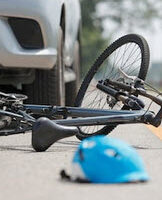Can I Still Recover Compensation for My Bicycle Accident if I Wasn’t Wearing a Helmet?

As a general rule, cyclists, regardless of age or skill, should always consider wearing a helmet while riding. This is especially true in Florida, which has a reputation for being one of the most dangerous states in the nation for cycling. Fortunately, motorists cannot bring up a cyclist’s decision not to wear a helmet in an effort to avoid liability for an accident. However, it’s still a good idea for cyclists who were injured in a collision with a vehicle to speak with an experienced Fort Lauderdale auto accident attorney who can ensure that any such attempts by a defendant are properly dismissed.
Florida’s Bicycle Helmet Law
In Florida, cyclists who are under the age of 16 years old are required to wear a helmet that meets federal safety standards when riding a bicycle. There is no similar universal law regarding older cyclists in Florida, so riders who are 16 years of age or older do not have to wear a helmet. This does not mean, however, that motorists who strike cyclists while driving do not often attempt to raise a cyclist’s decision not to wear a helmet (or a parent’s failure to ensure that his or her child was wearing a helmet) in an attempt to escape liability. Fortunately, this tactic is not permitted in Florida courts, as state lawmakers specifically bar defendants from using this argument to demonstrate a cyclist’s negligence and so reduce their own degree of responsibility for an accident.
Why Disproving Contributory Negligence is Important
Undercutting assertions of a cyclist’s contributory negligence is important because plaintiffs who are found to have been partially liable for their accidents will have their damages awards reduced in proportion to their degree of fault. While plaintiffs in any personal injury case will want to prevent a finding of contributory negligence, it is especially important for injured cyclists to do so, as these individuals are much more likely to sustain serious and even catastrophic injuries after being struck by a much larger vehicle without the benefit of protection from direct bodily impact.
It’s also important to remember that cyclists will only have the opportunity to recover damages after a collision with a motorist if they file a claim within four years of the date of the accident. Failing to file before this deadline will almost always result in a case being dismissed, leaving an injured party to shoulder the burden of injuries they sustained through no fault of their own. Generally, it’s also usually in a plaintiff’s best interests to begin investigation and case building immediately after a collision, when the evidence (and eyewitness testimony) is freshest.
Schedule a Free Consultation Today
Florida has one of the highest bicycle crash rates in the country, so it is important for cyclists in the state to have a thorough understanding of their legal rights and obligations under Florida law. To discuss these rights with an experienced auto accident attorney, please call Boone & Davis at 954-566-9919 or complete one of our brief online contact forms today.
Resource:
leg.state.fl.us/statutes/index.cfm?App_mode=Display_Statute&URL=0300-0399/0316/Sections/0316.2065.html
https://www.booneanddavislaw.com/liability-for-out-of-state-car-accidents/
